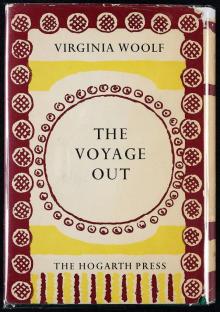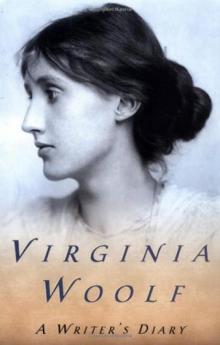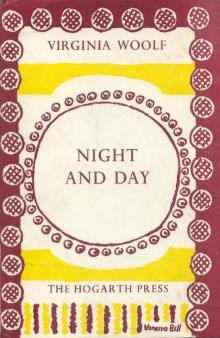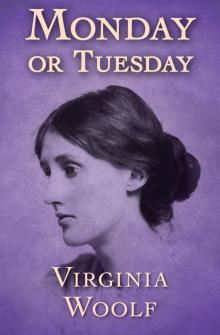- Home
- Virginia Woolf
Complete Works of Virginia Woolf Page 8
Complete Works of Virginia Woolf Read online
Page 8
“I don’t think so,” she said. “It’s the way of saying things, isn’t it, not the things?”
“True,” said Richard. “Perfectly true.” He paused. “When I look back over my life — I’m forty-two — what are the great facts that stand out? What were the revelations, if I may call them so? The misery of the poor and—” (he hesitated and pitched over) “love!”
Upon that word he lowered his voice; it was a word that seemed to unveil the skies for Rachel.
“It’s an odd thing to say to a young lady,” he continued. “But have you any idea what — what I mean by that? No, of course not. I don’t use the word in a conventional sense. I use it as young men use it. Girls are kept very ignorant, aren’t they? Perhaps it’s wise — perhaps — You don’t know?”
He spoke as if he had lost consciousness of what he was saying.
“No; I don’t,” she said, scarcely speaking above her breath.
“Warships, Dick! Over there! Look!” Clarissa, released from Mr. Grice, appreciative of all his seaweeds, skimmed towards them, gesticulating.
She had sighted two sinister grey vessels, low in the water, and bald as bone, one closely following the other with the look of eyeless beasts seeking their prey. Consciousness returned to Richard instantly.
“By George!” he exclaimed, and stood shielding his eyes.
“Ours, Dick?” said Clarissa.
“The Mediterranean Fleet,” he answered.
“The Euphrosyne was slowly dipping her flag. Richard raised his hat. Convulsively Clarissa squeezed Rachel’s hand.
“Aren’t you glad to be English!” she said.
The warships drew past, casting a curious effect of discipline and sadness upon the waters, and it was not until they were again invisible that people spoke to each other naturally. At lunch the talk was all of valour and death, and the magnificent qualities of British admirals. Clarissa quoted one poet, Willoughby quoted another. Life on board a man-of-war was splendid, so they agreed, and sailors, whenever one met them, were quite especially nice and simple.
This being so, no one liked it when Helen remarked that it seemed to her as wrong to keep sailors as to keep a Zoo, and that as for dying on a battle-field, surely it was time we ceased to praise courage— “or to write bad poetry about it,” snarled Pepper.
But Helen was really wondering why Rachel, sitting silent, looked so queer and flushed.
Chapter V
She was not able to follow up her observations, however, or to come to any conclusion, for by one of those accidents which are liable to happen at sea, the whole course of their lives was now put out of order.
Even at tea the floor rose beneath their feet and pitched too low again, and at dinner the ship seemed to groan and strain as though a lash were descending. She who had been a broad-backed dray-horse, upon whose hind-quarters pierrots might waltz, became a colt in a field. The plates slanted away from the knives, and Mrs. Dalloway’s face blanched for a second as she helped herself and saw the potatoes roll this way and that. Willoughby, of course, extolled the virtues of his ship, and quoted what had been said of her by experts and distinguished passengers, for he loved his own possessions. Still, dinner was uneasy, and directly the ladies were alone Clarissa owned that she would be better off in bed, and went, smiling bravely.
Next morning the storm was on them, and no politeness could ignore it. Mrs. Dalloway stayed in her room. Richard faced three meals, eating valiantly at each; but at the third, certain glazed asparagus swimming in oil finally conquered him.
“That beats me,” he said, and withdrew.
“Now we are alone once more,” remarked William Pepper, looking round the table; but no one was ready to engage him in talk, and the meal ended in silence.
On the following day they met — but as flying leaves meet in the air. Sick they were not; but the wind propelled them hastily into rooms, violently downstairs. They passed each other gasping on deck; they shouted across tables. They wore fur coats; and Helen was never seen without a bandanna on her head. For comfort they retreated to their cabins, where with tightly wedged feet they let the ship bounce and tumble. Their sensations were the sensations of potatoes in a sack on a galloping horse. The world outside was merely a violent grey tumult. For two days they had a perfect rest from their old emotions. Rachel had just enough consciousness to suppose herself a donkey on the summit of a moor in a hail-storm, with its coat blown into furrows; then she became a wizened tree, perpetually driven back by the salt Atlantic gale.
Helen, on the other hand, staggered to Mrs. Dalloway’s door, knocked, could not be heard for the slamming of doors and the battering of wind, and entered.
There were basins, of course. Mrs. Dalloway lay half-raised on a pillow, and did not open her eyes. Then she murmured, “Oh, Dick, is that you?”
Helen shouted — for she was thrown against the washstand— “How are you?”
Clarissa opened one eye. It gave her an incredibly dissipated appearance. “Awful!” she gasped. Her lips were white inside.
Planting her feet wide, Helen contrived to pour champagne into a tumbler with a tooth-brush in it.
“Champagne,” she said.
“There’s a tooth-brush in it,” murmured Clarissa, and smiled; it might have been the contortion of one weeping. She drank.
“Disgusting,” she whispered, indicating the basins. Relics of humour still played over her face like moonshine.
“Want more?” Helen shouted. Speech was again beyond Clarissa’s reach. The wind laid the ship shivering on her side. Pale agonies crossed Mrs. Dalloway in waves. When the curtains flapped, grey lights puffed across her. Between the spasms of the storm, Helen made the curtain fast, shook the pillows, stretched the bed-clothes, and smoothed the hot nostrils and forehead with cold scent.
“You are good!” Clarissa gasped. “Horrid mess!”
She was trying to apologise for white underclothes fallen and scattered on the floor. For one second she opened a single eye, and saw that the room was tidy.
“That’s nice,” she gasped.
Helen left her; far, far away she knew that she felt a kind of liking for Mrs. Dalloway. She could not help respecting her spirit and her desire, even in the throes of sickness, for a tidy bedroom. Her petticoats, however, rose above her knees.
Quite suddenly the storm relaxed its grasp. It happened at tea; the expected paroxysm of the blast gave out just as it reached its climax and dwindled away, and the ship instead of taking the usual plunge went steadily. The monotonous order of plunging and rising, roaring and relaxing, was interfered with, and every one at table looked up and felt something loosen within them. The strain was slackened and human feelings began to peep again, as they do when daylight shows at the end of a tunnel.
“Try a turn with me,” Ridley called across to Rachel.
“Foolish!” cried Helen, but they went stumbling up the ladder. Choked by the wind their spirits rose with a rush, for on the skirts of all the grey tumult was a misty spot of gold. Instantly the world dropped into shape; they were no longer atoms flying in the void, but people riding a triumphant ship on the back of the sea. Wind and space were banished; the world floated like an apple in a tub, and the mind of man, which had been unmoored also, once more attached itself to the old beliefs.
Having scrambled twice round the ship and received many sound cuffs from the wind, they saw a sailor’s face positively shine golden. They looked, and beheld a complete yellow circle of sun; next minute it was traversed by sailing stands of cloud, and then completely hidden. By breakfast the next morning, however, the sky was swept clean, the waves, although steep, were blue, and after their view of the strange under-world, inhabited by phantoms, people began to live among tea-pots and loaves of bread with greater zest than ever.
Richard and Clarissa, however, still remained on the borderland. She did not attempt to sit up; her husband stood on his feet, contemplated his waistcoat and trousers, shook his head, and then lay down again.
The inside of his brain was still rising and falling like the sea on the stage. At four o’clock he woke from sleep and saw the sunlight make a vivid angle across the red plush curtains and the grey tweed trousers. The ordinary world outside slid into his mind, and by the time he was dressed he was an English gentleman again.
He stood beside his wife. She pulled him down to her by the lapel of his coat, kissed him, and held him fast for a minute.
“Go and get a breath of air, Dick,” she said. “You look quite washed out. . . . How nice you smell! . . . And be polite to that woman. She was so kind to me.”
Thereupon Mrs. Dalloway turned to the cool side of her pillow, terribly flattened but still invincible.
Richard found Helen talking to her brother-in-law, over two dishes of yellow cake and smooth bread and butter.
“You look very ill!” she exclaimed on seeing him. “Come and have some tea.”
He remarked that the hands that moved about the cups were beautiful.
“I hear you’ve been very good to my wife,” he said. “She’s had an awful time of it. You came in and fed her with champagne. Were you among the saved yourself?”
“I? Oh, I haven’t been sick for twenty years — sea-sick, I mean.”
“There are three stages of convalescence, I always say,” broke in the hearty voice of Willoughby. “The milk stage, the bread-and-butter stage, and the roast-beef stage. I should say you were at the bread-and-butter stage.” He handed him the plate.
“Now, I should advise a hearty tea, then a brisk walk on deck; and by dinner-time you’ll be clamouring for beef, eh?” He went off laughing, excusing himself on the score of business.
“What a splendid fellow he is!” said Richard. “Always keen on something.”
“Yes,” said Helen, “he’s always been like that.”
“This is a great undertaking of his,” Richard continued. “It’s a business that won’t stop with ships, I should say. We shall see him in Parliament, or I’m much mistaken. He’s the kind of man we want in Parliament — the man who has done things.”
But Helen was not much interested in her brother-in-law.
“I expect your head’s aching, isn’t it?” she asked, pouring a fresh cup.
“Well, it is,” said Richard. “It’s humiliating to find what a slave one is to one’s body in this world. D’you know, I can never work without a kettle on the hob. As often as not I don’t drink tea, but I must feel that I can if I want to.”
“That’s very bad for you,” said Helen.
“It shortens one’s life; but I’m afraid, Mrs. Ambrose, we politicians must make up our minds to that at the outset. We’ve got to burn the candle at both ends, or—”
“You’ve cooked your goose!” said Helen brightly.
“We can’t make you take us seriously, Mrs. Ambrose,” he protested. “May I ask how you’ve spent your time? Reading — philosophy?” (He saw the black book.) “Metaphysics and fishing!” he exclaimed. “If I had to live again I believe I should devote myself to one or the other.” He began turning the pages.
“‘Good, then, is indefinable,’” he read out. “How jolly to think that’s going on still! ‘So far as I know there is only one ethical writer, Professor Henry Sidgwick, who has clearly recognised and stated this fact.’ That’s just the kind of thing we used to talk about when we were boys. I can remember arguing until five in the morning with Duffy — now Secretary for India — pacing round and round those cloisters until we decided it was too late to go to bed, and we went for a ride instead. Whether we ever came to any conclusion — that’s another matter. Still, it’s the arguing that counts. It’s things like that that stand out in life. Nothing’s been quite so vivid since. It’s the philosophers, it’s the scholars,” he continued, “they’re the people who pass the torch, who keep the light burning by which we live. Being a politician doesn’t necessarily blind one to that, Mrs. Ambrose.”
“No. Why should it?” said Helen. “But can you remember if your wife takes sugar?”
She lifted the tray and went off with it to Mrs. Dalloway.
Richard twisted a muffler twice round his throat and struggled up on deck. His body, which had grown white and tender in a dark room, tingled all over in the fresh air. He felt himself a man undoubtedly in the prime of life. Pride glowed in his eye as he let the wind buffet him and stood firm. With his head slightly lowered he sheered round corners, strode uphill, and met the blast. There was a collision. For a second he could not see what the body was he had run into. “Sorry.” “Sorry.” It was Rachel who apologised. They both laughed, too much blown about to speak. She drove open the door of her room and stepped into its calm. In order to speak to her, it was necessary that Richard should follow. They stood in a whirlpool of wind; papers began flying round in circles, the door crashed to, and they tumbled, laughing, into chairs. Richard sat upon Bach.
“My word! What a tempest!” he exclaimed.
“Fine, isn’t it?” said Rachel. Certainly the struggle and wind had given her a decision she lacked; red was in her cheeks, and her hair was down.
“Oh, what fun!” he cried. “What am I sitting on? Is this your room? How jolly!” “There — sit there,” she commanded. Cowper slid once more.
“How jolly to meet again,” said Richard. “It seems an age. Cowper’s Letters? . . . Bach? . . . Wuthering Heights? . . . Is this where you meditate on the world, and then come out and pose poor politicians with questions? In the intervals of sea-sickness I’ve thought a lot of our talk. I assure you, you made me think.”
“I made you think! But why?”
“What solitary icebergs we are, Miss Vinrace! How little we can communicate! There are lots of things I should like to tell you about — to hear your opinion of. Have you ever read Burke?”
“Burke?” she repeated. “Who was Burke?”
“No? Well, then I shall make a point of sending you a copy. The Speech on the French Revolution — The American Rebellion? Which shall it be, I wonder?” He noted something in his pocket-book. “And then you must write and tell me what you think of it. This reticence — this isolation — that’s what’s the matter with modern life! Now, tell me about yourself. What are your interests and occupations? I should imagine that you were a person with very strong interests. Of course you are! Good God! When I think of the age we live in, with its opportunities and possibilities, the mass of things to be done and enjoyed — why haven’t we ten lives instead of one? But about yourself?”
“You see, I’m a woman,” said Rachel.
“I know — I know,” said Richard, throwing his head back, and drawing his fingers across his eyes.
“How strange to be a woman! A young and beautiful woman,” he continued sententiously, “has the whole world at her feet. That’s true, Miss Vinrace. You have an inestimable power — for good or for evil. What couldn’t you do—” he broke off.
“What?” asked Rachel.
“You have beauty,” he said. The ship lurched. Rachel fell slightly forward. Richard took her in his arms and kissed her. Holding her tight, he kissed her passionately, so that she felt the hardness of his body and the roughness of his cheek printed upon hers. She fell back in her chair, with tremendous beats of the heart, each of which sent black waves across her eyes. He clasped his forehead in his hands.
“You tempt me,” he said. The tone of his voice was terrifying. He seemed choked in fright. They were both trembling. Rachel stood up and went. Her head was cold, her knees shaking, and the physical pain of the emotion was so great that she could only keep herself moving above the great leaps of her heart. She leant upon the rail of the ship, and gradually ceased to feel, for a chill of body and mind crept over her. Far out between the waves little black and white sea-birds were riding. Rising and falling with smooth and graceful movements in the hollows of the waves they seemed singularly detached and unconcerned.
“You’re peaceful,” she said. She became peaceful too, at the same time possessed with a strange
exultation. Life seemed to hold infinite possibilities she had never guessed at. She leant upon the rail and looked over the troubled grey waters, where the sunlight was fitfully scattered upon the crests of the waves, until she was cold and absolutely calm again. Nevertheless something wonderful had happened.
At dinner, however, she did not feel exalted, but merely uncomfortable, as if she and Richard had seen something together which is hidden in ordinary life, so that they did not like to look at each other. Richard slid his eyes over her uneasily once, and never looked at her again. Formal platitudes were manufactured with effort, but Willoughby was kindled.
“Beef for Mr. Dalloway!” he shouted. “Come now — after that walk you’re at the beef stage, Dalloway!”
Wonderful masculine stories followed about Bright and Disraeli and coalition governments, wonderful stories which made the people at the dinner-table seem featureless and small. After dinner, sitting alone with Rachel under the great swinging lamp, Helen was struck by her pallor. It once more occurred to her that there was something strange in the girl’s behaviour.
“You look tired. Are you tired?” she asked.
“Not tired,” said Rachel. “Oh, yes, I suppose I am tired.”
Helen advised bed, and she went, not seeing Richard again. She must have been very tired for she fell asleep at once, but after an hour or two of dreamless sleep, she dreamt. She dreamt that she was walking down a long tunnel, which grew so narrow by degrees that she could touch the damp bricks on either side. At length the tunnel opened and became a vault; she found herself trapped in it, bricks meeting her wherever she turned, alone with a little deformed man who squatted on the floor gibbering, with long nails. His face was pitted and like the face of an animal. The wall behind him oozed with damp, which collected into drops and slid down. Still and cold as death she lay, not daring to move, until she broke the agony by tossing herself across the bed, and woke crying “Oh!”

 Three Guineas
Three Guineas Flush
Flush Mrs. Dalloway
Mrs. Dalloway The Voyage Out
The Voyage Out A Writer's Diary: Being Extracts From the Diary of Virginia Woolf
A Writer's Diary: Being Extracts From the Diary of Virginia Woolf To The Lighthouse
To The Lighthouse Night and Day
Night and Day Monday or Tuesday
Monday or Tuesday Complete Works of Virginia Woolf
Complete Works of Virginia Woolf Orlando
Orlando Genius and Ink
Genius and Ink Mrs. Dalloway (Annotated)
Mrs. Dalloway (Annotated) Jacob's Room
Jacob's Room THE RUSSIAN POINT OF VIEW
THE RUSSIAN POINT OF VIEW A Writer's Diary
A Writer's Diary Woolf Short Stories
Woolf Short Stories